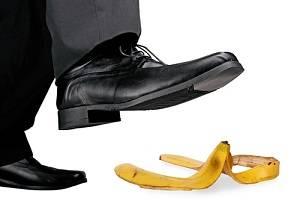
Liability for Injuries Caused by a Slip and Fall
 When you are a visitor or guest on someone else’s property, the property own has a responsibility to ensure that you are safe. He or she is not necessarily responsible for stopping you from making poor decisions while on the property, but the owner must take steps to keep the premises free of potential hazards that could cause you to slip and fall or trip and fall. If the property owner does not keep the property safe and you suffer injuries as a result of his or negligence, you could be entitled to collect compensation through a premises liability claim.
When you are a visitor or guest on someone else’s property, the property own has a responsibility to ensure that you are safe. He or she is not necessarily responsible for stopping you from making poor decisions while on the property, but the owner must take steps to keep the premises free of potential hazards that could cause you to slip and fall or trip and fall. If the property owner does not keep the property safe and you suffer injuries as a result of his or negligence, you could be entitled to collect compensation through a premises liability claim.
Recovering compensation for slip-and-fall injuries requires the plaintiff—that is you—to show four primary things:
- The property owner owed you a duty of care. Proving a duty of care includes several elements. You will need to show that the defendant owns or occupies the premises where your injury occurred and that he or she is responsible for keeping the property safe. You must also show that you were permitted to be on the property, as trespassers are not owed the same duty of care as invited guests or visitors.
- A hazard existed on the property. The second thing you need to prove is that a dangerous condition existed on the premises. This could include a slippery floor with no warning signs, broken floor tiles, poorly lit areas, or merchandised that is unsafely stacked. Keep in mind that a hazardous condition must be capable of causing injuries.
- The owner knew or should have known about the problem and did not address it. A property owner can only be held liable for your injuries if he or she was aware (or should have been aware) that there was a hazardous condition on the property. Proving this element may depend on how long the condition existed. For example, an owner should know that a railing on a commonly-used staircase was broker, but he or she may not yet have known about a spill that happened just moments before your accident.
- You suffered harm as a result. Lastly, your right to collect damages will hinge on your ability to prove that the hazardous condition is what caused your injuries. Any action that the property owner took to mitigate the danger will be considered at this stage as well. For example, if the owner placed signs warning visitors of the broken railing and you used the staircase anyway, the owner’s liability could be reduced.
Speak With a Personal Injury Lawyer
If you have suffered an injury on another person’s property, an experienced Orland Park premises liability attorney can walk you through your options for recovering damages. Call 708-888-2160 for a free consultation and case evaluation at Schwartz Injury Law today.
Sources:
http://www.illinoiscourts.gov/CircuitCourt/CivilJuryInstructions/120.00.pdf
http://www.ilga.gov/legislation/ilcs/ilcs3.asp?ActID=2048&ChapterID=57








